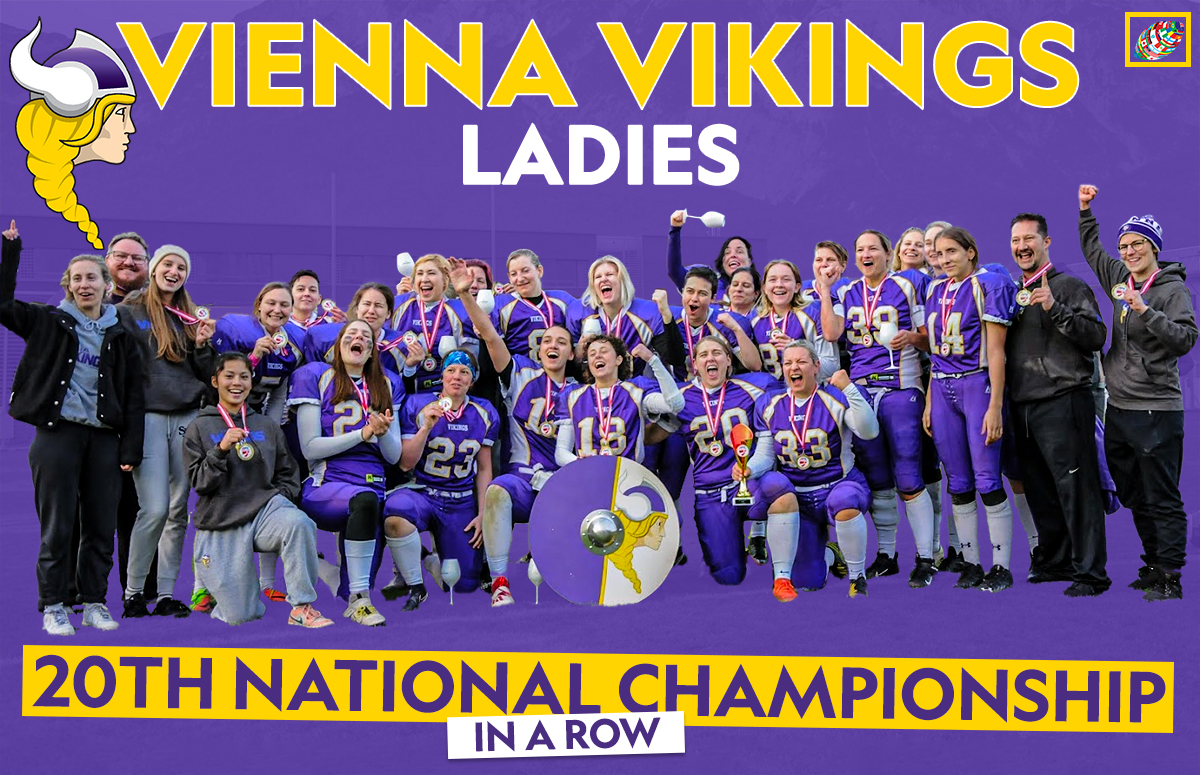Vienna Viking ladies create history with 20th Austrian championship in a row

The Vienna Vikings ladies’ squad of Austria have etched their name in history with their 20th National Championship win in a row following a 48–0 victory earlier this fall over the Telfs Patriots. But the ladies’ victory has, for the most part, been sidelined and gone without recognition.
Led by Head Coach Cameron Frickey for the past 18 seasons, the Vikings ladies nine-a-side team has dominated both domestically and internationally since its inception.
Frickey, a Western Oregon (NCAA, DII) alumnus who still holds the record for most receptions in a game with 16, first came to Vienna as an import in 97’ following a glowing recommendation from his former teammate Brian Traeger who played for the Kiel Baltic Hurricanes in Germany the year prior.
After six years with the Vikings, and some coaching in his spare time, Frickey was offered the reins and took over as head coach. Despite the team hoisting two championships before Frickey’s arrival, the Head Coach describes the positive transformation within the squad:
Back when I first joined we had great girls but not great athletes. They couldn’t even complete a ten-yard pass. I remember in one of the first practices I lined the girls up for a catching drill and of ten passes one or two were catchable, but no one caught them!
Now the girls are amazing though. My quarterback is great, she completes passes that some men playing the sport couldn’t. The game is faster now too. I think this is down to exposure to the sport and the girls coming in are younger so we have more time to develop them.
But we still have the same issues every year. We have no idea who will play for us and where they will come from as there is no youth team.
One of the ladies that Frickey has had a chance to develop is team captain Cilia Nagel who plays receiver and linebacker. Like most of the best players on the women’s team, Nagel plays both ways. Her path to success in the sport is typical for the new generation of young budding athletes:
I’ve been playing for seven years now. I joined the Junior Tigers in Vienna for the U18 team, which is a boys and girls squad. The game is just much faster with the boys and that helps you to excel when you play women’s.
When I turned 18 I joined the Vikings girls team as the Junior Tigers had no adult team. The transition was so easy. One of my coaches for Junior Tigers played for them, so she along with the other girls made me feel so welcomed.
But the women’s game is not without its hardships. The league currently consists of only three teams (Salzburg Ducks, Telfs Patriots) after being decimated by Covid-19 and runs from just September to November. Prior to the pandemic the league had seen substantial growth, sporting seven members and even included a team from Budapest, Hungary, meaning far more games were played.
Unlike the men’s game in Europe, the women were left to fend for themselves during the pandemic and saw a significant reduction in players due to an odd league rule meaning that only athletes who had paid for a membership prior to practicing could join the team.
To make matters worse the Vikings ladies team receives little to no support from their counterparts in both the Austrian Football League (AFL) or European League of Football (ELF). Twenty National Championships on the trot is an absurd achievement regardless of the sport or the gender playing it. Despite sharing a practice field and namesake, no mention of the lady Vikings’ victory was made on either the men’s AFL or ELF social media channels.
Like most football in Europe, the ladies sport in Vienna has been detrimentally impacted by politics. But despite this, the women’s game in Vienna continues to thrive with overwhelming success thanks to the sacrifices and commitment of a few. It is up to the rest of the football community in Europe to champion our women athletes and make the sport as inclusive as possible so it can grow collectively.